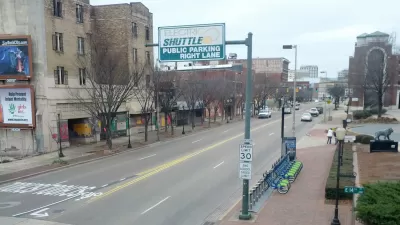Bike share programs are spreading throughout the United States, now in 36 urban areas, up from six four years ago. However, half the programs have encountered technical or financial difficulties, according to a tally by The Wall Street Journal.
Reporting from Chattanooga, where a small but successful two-year-old bike share program [we've posted articles on the Chattanooga Bicycle Transit System here and here] operates, Andrew Tangel of The Wall Street Journal illustrates some of the growing pains in bike share programs here and throughout the country.
The initial funding of $2.1 million (for Bike Chattanooga) has been spent, revenue has fallen short, and the number of yearly memberships sold to frequent riders is about 90% smaller than projected.
One problem cited: "an ample, cheap supply of parking." Parking for cars, that is.
Even the nation's largest program, Citi Bike in New York City, has experienced financial difficulties.
"The business is dominated by a small number of companies, including PBSC Urban Solutions Inc., of Montreal. PBSC sells bikes and technology to many of the biggest programs in the U.S. but filed for bankruptcy in January," writes Tangel.
PBSC's international operations have been purchased by Bruno Rodi. "We're looking forward to the logjam breaking," says Mia Birk, vice president of Alta Bicycle Share Inc., a Portland company that runs bike-share programs using PBSC's system.
Susan Shaheen, a researcher of bike-share programs at the University of California, Berkeley, adds: "The business model is still under development. Some of it is trial and error."
Ryan Rzepecki, chief executive of Social Bicycles Inc., of New York, supplier to eight cities was more straight forward. "The industry is kind of a mess."
Warts and all, programs are spreading. "By the end of next year, there could be as many as 38,000 shared bicycles across the U.S., researchers at Earth Policy Institute estimate," adds Tangel.
Correspondent's note: Link to Wall Street Journal article should be fully accessible to non-subscribers through July 17.
FULL STORY: Bike Shares Spread but Face Uphill Climb

Planetizen Federal Action Tracker
A weekly monitor of how Trump’s orders and actions are impacting planners and planning in America.

Map: Where Senate Republicans Want to Sell Your Public Lands
For public land advocates, the Senate Republicans’ proposal to sell millions of acres of public land in the West is “the biggest fight of their careers.”

Restaurant Patios Were a Pandemic Win — Why Were They so Hard to Keep?
Social distancing requirements and changes in travel patterns prompted cities to pilot new uses for street and sidewalk space. Then it got complicated.

Platform Pilsner: Vancouver Transit Agency Releases... a Beer?
TransLink will receive a portion of every sale of the four-pack.

Toronto Weighs Cheaper Transit, Parking Hikes for Major Events
Special event rates would take effect during large festivals, sports games and concerts to ‘discourage driving, manage congestion and free up space for transit.”

Berlin to Consider Car-Free Zone Larger Than Manhattan
The area bound by the 22-mile Ringbahn would still allow 12 uses of a private automobile per year per person, and several other exemptions.
Urban Design for Planners 1: Software Tools
This six-course series explores essential urban design concepts using open source software and equips planners with the tools they need to participate fully in the urban design process.
Planning for Universal Design
Learn the tools for implementing Universal Design in planning regulations.
Heyer Gruel & Associates PA
JM Goldson LLC
Custer County Colorado
City of Camden Redevelopment Agency
City of Astoria
Transportation Research & Education Center (TREC) at Portland State University
Camden Redevelopment Agency
City of Claremont
Municipality of Princeton (NJ)



























